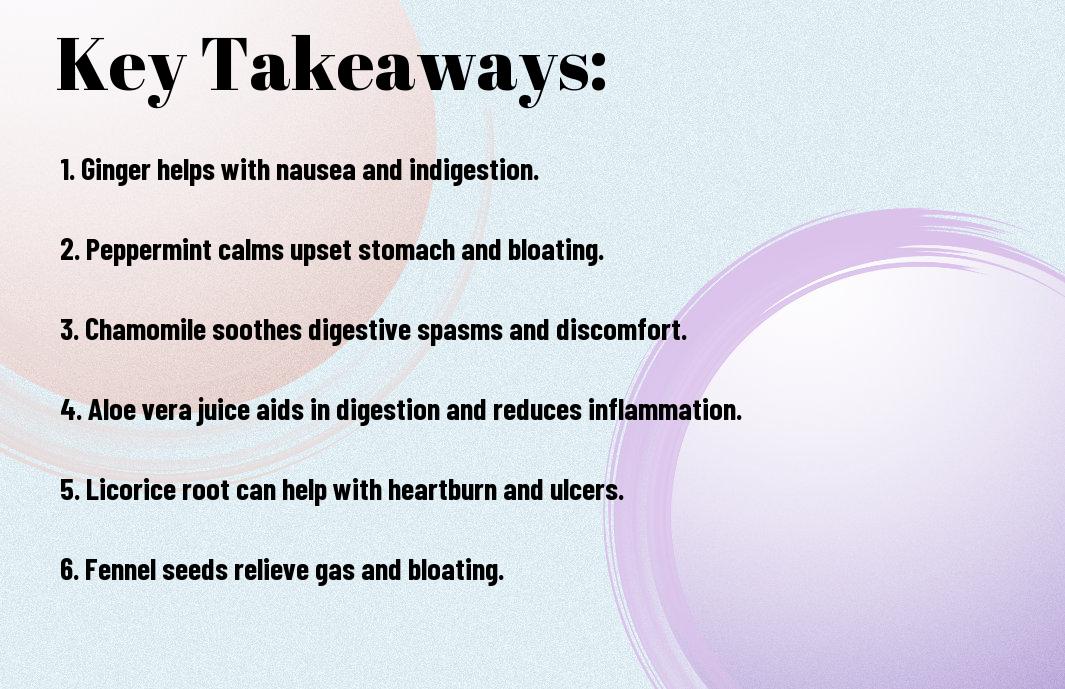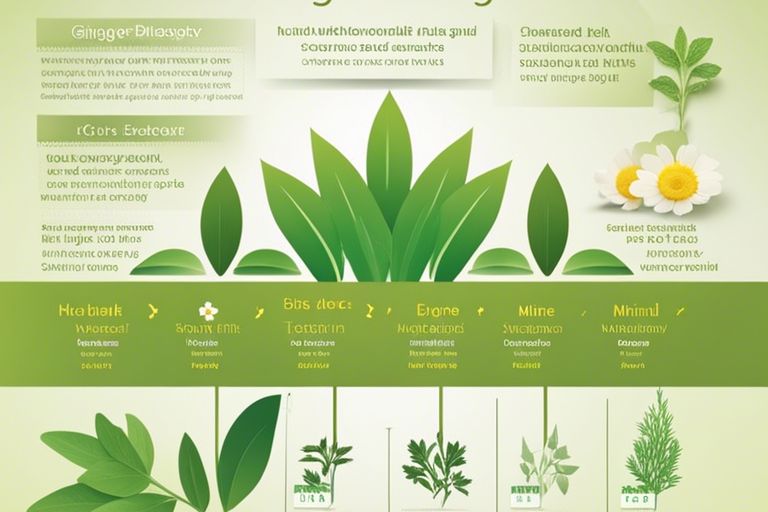Most of us have experienced digestive issues at some point in our lives, whether it’s bloating, indigestion, or stomach cramps. Instead of relying on over-the-counter medications, why not turn to the power of herbs to promote better digestion? In this informative post, we will explore some herbal remedies that have been used for centuries to aid digestion and soothe the stomach. From ginger to peppermint, these natural remedies may just be the solution you’ve been looking for to improve your gut health and overall well-being.
Key Takeaways:
- Herbal remedies can help alleviate digestive issues such as bloating, gas, and indigestion.
- Peppermint, ginger, and chamomile are commonly used herbs for digestive health and can aid in soothing the digestive system.
- It is important to consult a healthcare practitioner before incorporating herbal remedies into your digestive wellness routine to ensure they are safe and effective for you.
The Importance of Digestive Health
Your digestive system plays a crucial role in your overall health and well-being. It is responsible for breaking down food, absorbing nutrients, and eliminating waste. Healthy digestion is crucial for proper functioning of the body as it affects everything from your energy levels to your immune system. When your digestive system is not functioning optimally, it can lead to various health issues and discomfort.
The Gut-Brain Connection
For centuries, researchers have acknowledged the connection between the gut and the brain. Your gut is often referred to as your “second brain” because it houses millions of neurons that communicate with your brain. This communication pathway, known as the gut-brain axis, plays a crucial role in regulating your emotions, mood, and even cognitive functions. Therefore, taking care of your gut health is not only beneficial for your digestive system but also for your mental well-being.
Common Digestive Issues and Their Impact
Health issues such as IBS, GERD, and food intolerances are becoming increasingly common in today’s society. These conditions can significantly impact your quality of life, causing symptoms such as bloating, gas, stomach pain, and diarrhea. If left unaddressed, they can lead to more serious complications and nutritional deficiencies. It’s crucial to address these digestive issues promptly and make necessary lifestyle changes to promote better gut health.
Herbal Remedies for Digestive Issues
Some herbal remedies can help soothe common digestive issues such as bloating, indigestion, and heartburn. These natural remedies have been used for centuries to promote digestive health and provide relief from discomfort.
Soothing Inflammation with Turmeric and Ginger
With turmeric and ginger, you can reduce inflammation in the digestive tract. Turmeric contains curcumin, a compound known for its anti-inflammatory properties, while ginger helps soothe the stomach and reduce nausea. You can enjoy these herbs in teas, smoothies, or add them to your cooking for added digestive benefits.
The Calming Effects of Peppermint and Chamomile
With peppermint and chamomile, you can calm digestive spasms and reduce bloating. Peppermint helps relax muscles in the digestive tract, while chamomile has anti-inflammatory and antispasmodic properties. Enjoy a cup of peppermint or chamomile tea after meals to aid digestion and promote overall digestive health.
Remedies: Peppermint and chamomile are not only soothing for the digestive system but also promote relaxation and reduce stress, which can further improve digestion. Incorporating these herbs into your daily routine can provide long-term benefits for your digestive health.
Licorice Root for Heartburn and Indigestion
To ease heartburn and indigestion, consider using licorice root. Licorice root contains compounds that help protect the stomach lining and reduce acid reflux. You can find licorice root supplements or teas that can be taken before meals to support healthy digestion.
Ginger: Licorice root should be consumed in moderation as excessive intake can lead to high blood pressure or low potassium levels. Consult with a healthcare provider before using licorice root as a remedy for digestive issues.
Natural Laxatives and Anti-Diarrheal Agents
Not all digestive issues can be solved with over-the-counter medications. Sometimes, turning to natural remedies can provide gentle yet effective relief. In the context of promoting healthy bowel movements and alleviating constipation or diarrhea, certain herbal remedies have been used for centuries with great success.
Senna and Cascara Sagrada for Constipation
An age-old remedy for constipation, senna and cascara sagrada are two herbs known for their laxative properties. They work by stimulating the muscles in the intestines, promoting bowel movements and relieving constipation. It is important to note that while these herbs can be effective, they should be used occasionally and not relied upon for regular bowel movements, as they can be harsh on the digestive system with prolonged use.
Slippery Elm and Marshmallow Root for Diarrhea
Marshmallow root and Slippery Elm are excellent choices when it comes to soothing and treating diarrhea. These herbs contain mucilage, a gel-like substance that coats the digestive tract, providing relief from inflammation and irritation. Marshmallow root has also been found to have antimicrobial properties, which can help in fighting off infections that may be causing diarrhea.
Marshmallow plants have been used for centuries as a remedy for digestive issues due to their high mucilage content, which provides a soothing coating to the digestive tract. Slippery Elm, on the other hand, is known for its ability to absorb toxins and excess water in the intestines, promoting firmer stools and reducing the frequency of diarrhea.
Probiotics and Prebiotics in Herbal Remedies
For How Herbal Medicine Can Support Your Digestion, incorporating probiotics and prebiotics into your herbal remedies can significantly improve your gut health and digestion. Probiotics are live bacteria that are beneficial for gut health when consumed in adequate amounts. Prebiotics, on the other hand, are non-digestible fibers that promote the growth of beneficial bacteria in the gut.
The Role of Probiotics in Gut Health
For a healthy gut, probiotics play a crucial role in balancing the intestinal flora and supporting the digestive process. Probiotics can help improve digestion, boost the immune system, and enhance nutrient absorption. By incorporating probiotic-rich herbs like ginger and garlic into your herbal remedies, you can promote a healthy gut microbiome and overall well-being.
Prebiotic-Rich Herbs like Dandelion and Burdock
To further enhance the benefits of probiotics, incorporating prebiotic-rich herbs like dandelion and burdock into your herbal remedies can provide nourishment for the beneficial bacteria in your gut. These herbs contain inulin, a powerful prebiotic fiber that supports the growth of healthy gut bacteria and helps improve digestion. Including dandelion and burdock in your herbal remedies can aid in reducing bloating, improving bowel movements, and supporting overall gut health.
Another great benefit of prebiotic-rich herbs like dandelion and burdock is their anti-inflammatory properties, which can help alleviate digestive discomfort and promote a healthy gut lining. Incorporating these herbs into your herbal remedies can be a natural and effective way to support your digestive system and improve your overall well-being.
Herbal Teas for Digestive Wellness
Many herbal teas can provide soothing relief for a variety of digestive issues. Whether you are dealing with bloating, gas, or stress-related digestive issues, there are herbal remedies that can help alleviate discomfort and promote overall digestive wellness.
Fennel and Caraway Seeds for Bloating and Gas
Teas infused with fennel and caraway seeds are excellent choices for reducing bloating and gas. Fennel is known for its anti-inflammatory properties, which can help relax the digestive tract and reduce bloating. Caraway seeds are rich in vital oils that aid in digestion and ease gas discomfort. Together, these two herbs create a powerful blend that can promote digestive comfort and relieve bloating and gas.
Lemon Balm and Lavender for Stress-Related Digestive Issues
Wellness teas containing lemon balm and lavender are especially beneficial for those dealing with stress-related digestive issues. Lemon balm is known for its calming effects on the nervous system, which can help reduce stress and anxiety that may be contributing to digestive upset. Lavender is also revered for its relaxing properties, making it a great addition to teas aimed at promoting digestive wellness during times of stress.
These herbs work synergistically to not only soothe the digestive system but also to calm the mind and body, creating a holistic approach to managing stress-related digestive issues.
Combining Herbal Remedies for Optimal Results
To get the most out of herbal remedies for digestive issues, it’s necessary to understand how different herbs can work together synergistically. Combining the right herbs can enhance their individual effects and provide more significant relief. Whether you are dealing with bloating, indigestion, or other digestive problems, creating customized blends can target your specific needs.
Creating Customized Blends for Individual Needs
Individual digestive issues vary from person to person, which is why creating customized herbal blends can be incredibly beneficial. By combining herbs such as peppermint for soothing and chamomile for calming, you can address multiple symptoms at once. Consult with a knowledgeable herbalist to determine the best combination of herbs for your unique digestive concerns.
Interactions and Contraindications to Consider
Results of mixing different herbs can sometimes lead to unexpected interactions or contraindications. It’s crucial to research and understand how herbs may interact with each other or with any medications you are taking. For example, some herbs may enhance the effects of blood-thinning medications, leading to potentially dangerous situations. Always consult with a healthcare provider before combining herbal remedies, especially if you have any underlying health conditions.
Consider the potential positive and negative interactions between herbs to ensure that you are creating a safe and effective blend. While herbal remedies can offer natural relief for digestive issues, it’s necessary to approach their use with caution and awareness of any potential risks.

To wrap up
Following this informative guide on herbal remedies for digestive issues, it is clear that nature provides us with a variety of options to support our digestive health. From soothing chamomile tea to digestion-boosting peppermint, there are natural remedies available to help alleviate common digestive discomforts. It is important to consult with a healthcare professional before incorporating any new herbs or supplements into your routine, especially if you have existing health conditions or are taking medication.
Incorporating herbal remedies into your wellness routine can be a gentle and effective way to support your digestive system, allowing you to experience relief from issues such as bloating, gas, and indigestion. By tuning into the wisdom of nature and exploring the benefits of herbal medicine, you can take proactive steps towards improving your digestive health and overall well-being.
FAQ
Q: What are some herbal remedies for digestive issues?
A: Herbal remedies for digestive issues include peppermint, ginger, chamomile, and turmeric. These herbs can help alleviate symptoms such as bloating, indigestion, and stomach cramps.
Q: How do herbal remedies help with digestive issues?
A: Herbal remedies contain natural compounds that can support digestion by reducing inflammation, promoting gut health, and soothing digestive discomfort. They can also help regulate bowel movements and improve overall digestive function.
Q: Are there any potential side effects of using herbal remedies for digestive issues?
A: While herbal remedies are generally safe, some individuals may experience allergic reactions or interactions with medications. It is important to consult with a healthcare provider before incorporating herbal remedies into your routine, especially if you are pregnant, nursing, or have underlying health conditions.

